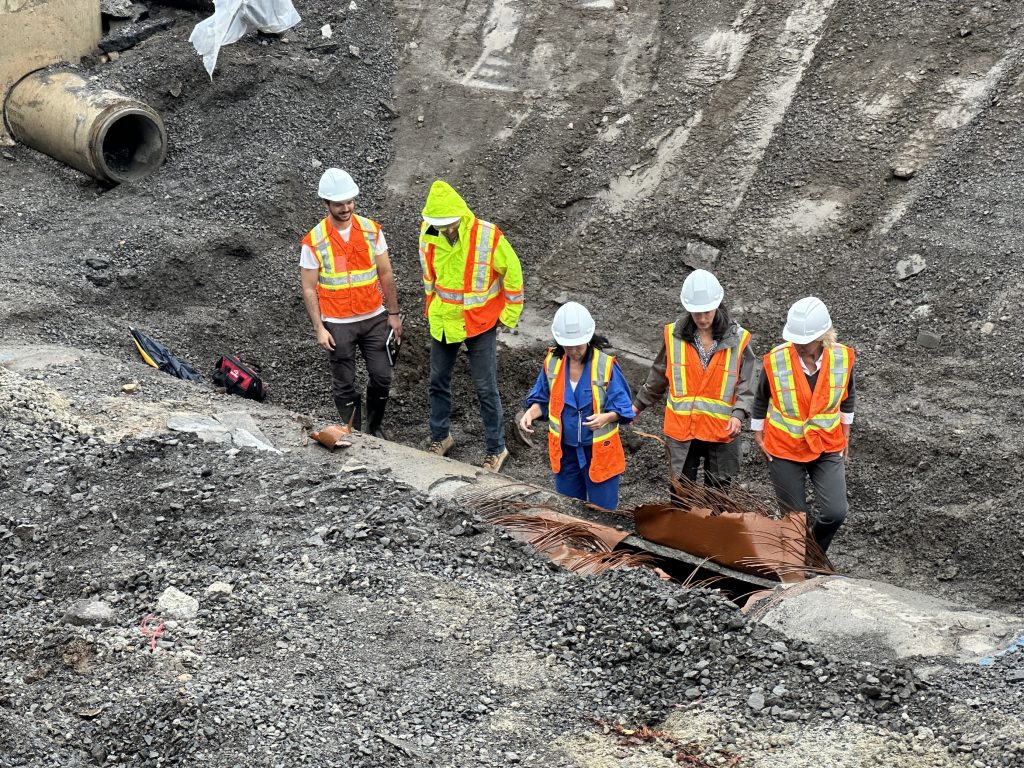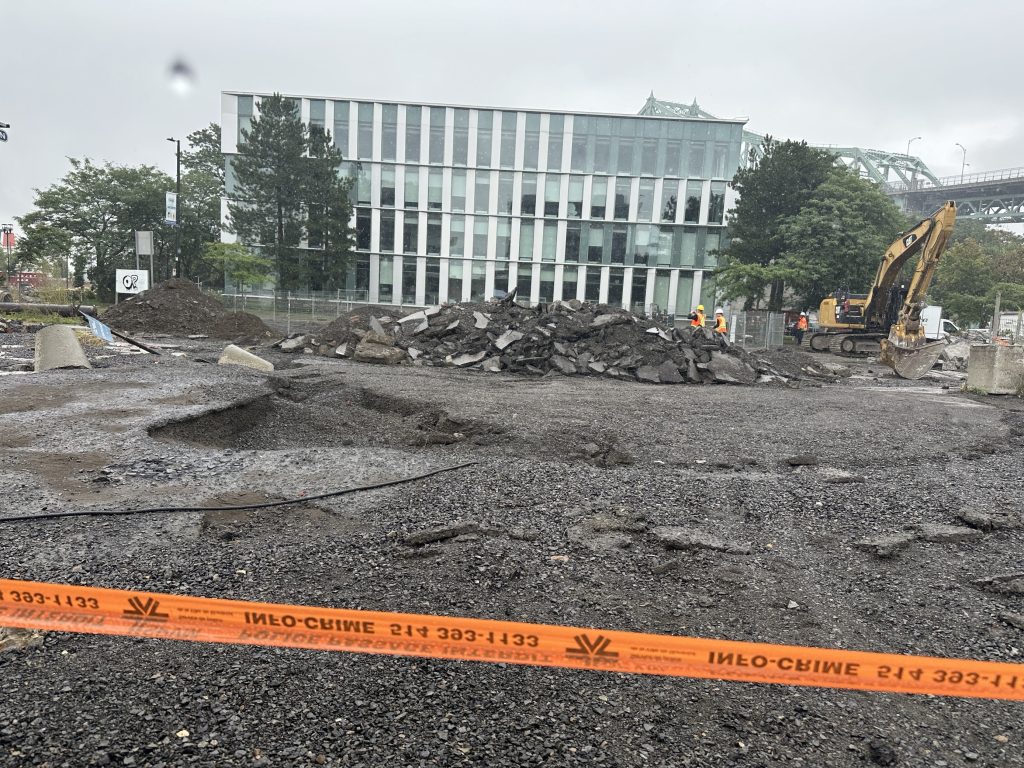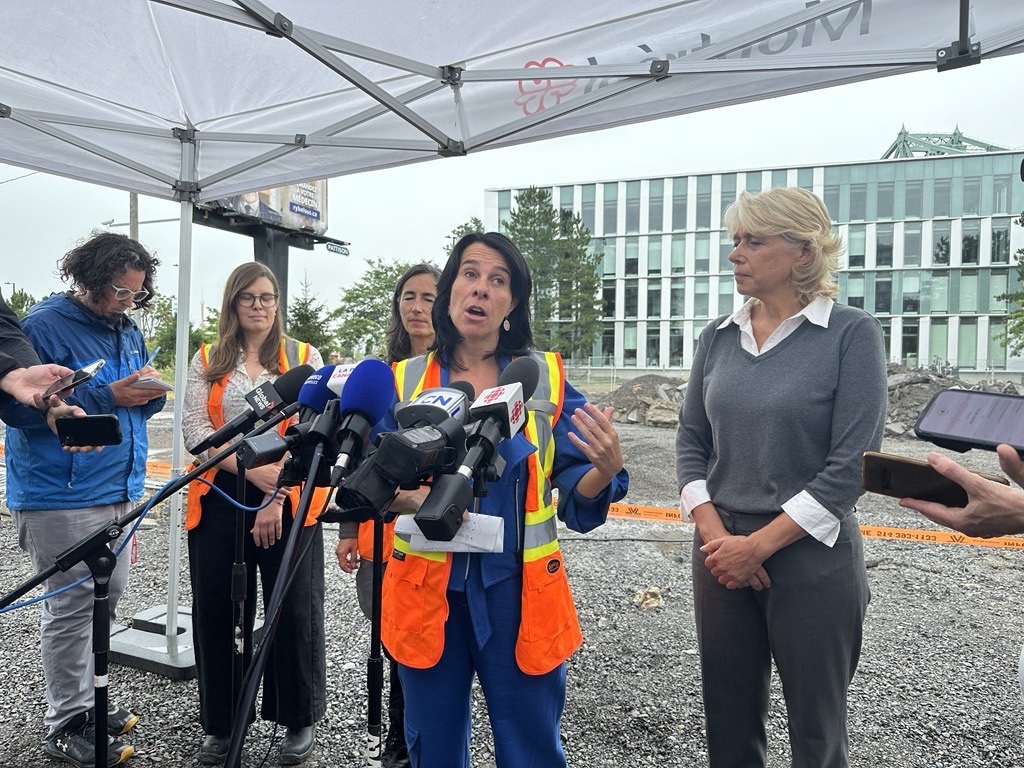Montreal water main showed corrosion years before break, official says
Posted August 19, 2024 11:40 am.
Last Updated August 19, 2024 6:10 pm.
Repairs are underway in Montreal after a major water main break last week sent a geyser into the air – that at its peak it was shooting 10 metres high – near the Jacques-Cartier bridge area at René-Lévesque Blvd. and de Lorimier Ave. But the cause still remains unknown and the city revealed that the pipe had been “under surveillance.”
“We don’t know exactly what happened it is important for us to gather all the information,” said Montreal Mayor Valérie Plante.
The pipe had suffered corrosion over the years, but thought there was still time before it needed to be repaired, the head of the city’s water service said Monday.
Chantal Morissette told reporters the city noticed the pipe was deteriorating during an inspection in 2017 or 2018. She said a followup inspection was planned for October.
“But the pipe burst before we arrived, so the corrosion was more advanced than what we suspected during the investigation,” she said.
Plante said that crews are removing debris from roads in the area, a specific piece they need to repair the two-metre-wide pipe will take weeks to get – and Montrealers need to be patient.
“Sometimes construction sites are not fun, but it is necessary,” she said on the site of the water main, hoping that the population would be more understanding about the traffic it will cause.
It all started around 6 a.m. on Friday, with water gushing into the streets, at times, waist-high. By around 11:36 a.m. the main had been capped.
There were 50 homes and businesses flooded on Aug. 16 – and power cut to thousands. About 16 families are still being helped by the Red Cross, as they aren’t able to reintegrate into their homes.
Jean-François Latour was one of those people who reached out to the Red Cross.
“They give me some money for food, few clothes but when I went back the next morning the place was closed already.”

Latour says his home was submerged in water on Friday and most of his belongings are now garbage.
“The water came rushing down and blew the door open.”
A preventative boil-water advisory was sent out for some boroughs, that lasted until Saturday night – impacting about 150,000 homes.
“We take this very seriously because giving water to citizens is the base is something that you know we want to make sure it’s not being affected,” said Plante.

The city said it will take weeks to fix the 84-inch pipe that erupted and it’s still unclear what triggered the nearly 40-year-old pipe to break.
The pipe involved in Friday’s water main break was a C301 pre-stressed concrete pressure pipe, which consists of a steel cylinder embedded in concrete and reinforced with steel wire.
Morissette said corrosion, possibly caused by water accumulation or road salt, can break the steel wires and eventually cause such pipes to explode.
In theory, water main pipes can last for 100 years, but C301 pipes have a shorter lifespan than those built earlier in the 20th century, Morissette said. The pipe that burst on Friday had been installed in 1985.
Despite this latest incident, Morissette said, recent investments have cut the number of water main breaks in Montreal by 50 per cent in the last 12 years. She said 90 per cent of the city’s network is in good shape.
Morissette said the city inspects 10 to 15 kilometres of water main pipes per year, and evaluates the risks of letting damaged pipes continue to operate. During the latest inspection, this particular pipe “was judged capable to continue to serve the purpose for which it was designed,” she said. “Otherwise we would have stopped it.”
There’s no timeline on when the repairs will be finished.
The mayor explained that city has been upgrading the water network. “It is absolutely necessary and knowing it’ll reduce by 50 per cent the number of incidents gives me the kind of courage and willingness to do more,” Plante added.
A 2019 Canadian Infrastructure Report Card found that 30 per cent of water infrastructure in the country is in fair, poor or very poor condition. Montreal is not the only city dealing with this issue. Two months ago, a water main break also flooded parts of Calgary.
Daniel Lingnau, a senior application specialist with the Edmonton-based Pipeline Inspection and Condition Analysis Corporation, said C301 pipes were developed during the Second World War to minimize the use of steel, which was being diverted for the war effort. But if corrosion snaps the steel wires, he said, the concrete can crack and eventually cause the steel cylinder to rupture.
“For this type of pipe, when it does fail, it does tend to fail … catastrophically,” he said. “Meaning a big hole is punched in it, as opposed to a steel pipe that might just have a local perforation, and therefore the amount of volume of water wouldn’t be released as quickly.”
Lingnau said these pipes can have a lifespan exceeding 50 years, but many factors affect how long they last. “And one of the big factors that has been evolving over our generation is a lot of use of road salts, and road salts are particularly bad for concrete,” he said.
A 2008 report from the National Research Council Canada noted that pre-stressed concrete pipes are known for “good strength and capacity to resist high internal pressure,” but are prone to corrosion that can lead to catastrophic failures. Such failures “are always associated with lack in maintenance operations due to underestimating the condition of the pipe and thus its priority to be repaired,” the report says.
Last summer, a smaller water main break in Montreal involving a C301 pipe led to the evacuation of 18 buildings and a boil-water advisory for part of the city’s St-Michel and Rosemont neighbourhoods.

Major water mains are difficult to inspect and very expensive to repair, Lingnau said. “And that’s one of the big challenges. Much of this buried infrastructure is coming up near end of life, but the funding for replacement of it as our cities grow has declined.”
Morissette said repairs to the pipe could cost $4,000 to $5,000 per cubic metre. But despite this latest incident, she said, recent investments have cut the number of water main breaks in Montreal by 50 per cent in the last 12 years. She said 90 per cent of the city’s network is in good shape.
Plante also gave an update on the damage caused by torrential rain that hit Montreal on Aug. 9, and said more than 3,300 private buildings and about 60 municipal buildings were flooded.
-With files from The Canadian Press








